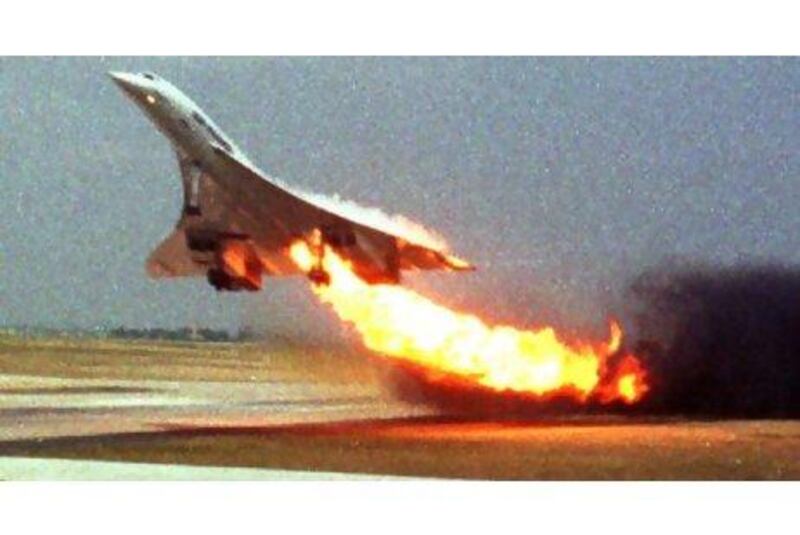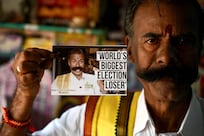PARIS // The US carrier Continental Airlines was found to be criminally responsible by a French court yesterday for the Concorde crash north of Paris that killed all 109 people on board and effectively ended supersonic air travel.
The airline was fined €200,000 (Dh974,400) and one of its mechanics, John Taylor, received a 15-month suspended prison sentence from the correctional court at Pontoise, a short distance from the crash site of Air France flight 4590 on July 25, 2000.
French accident investigators concluded that the disaster was caused by a 43cm strip of titanium that fell off a Continental DC10 as it took off from Charles de Gaulle airport shortly before the Concorde was due to depart. The metal led to a Concorde tyre bursting and debris flew up, tearing into the supersonic jet's fuel tank.
The plane, most of whose passengers were German tourists bound for New York, crashed in flames on a hotel in the town of Gonesse. Nine crew members were among the dead, and four people were killed on the ground.
Continental was held by the court to be guilty of "involuntary manslaughter" because of negligence in the DC10's maintenance.
The airline - which later described the verdicts as "absurd" and made clear it would appeal - was also ordered to pay civil damages of €1m (Dh4.88m) to Air France, operators of the Concorde.
Mr Taylor, 42, who was said to have fitted the strip to the DC10, was fined Dh9,700. The only individual found criminally at fault, he was not in court to hear the verdicts.
Three French defendants have been cleared of wrongdoing, as has another Continental employee, Stanley Ford, Mr Taylor's former supervisor.
Compensation amounting to more than Dh4 billion has been paid by Air France to families of those who died and the French state carrier or its insurers may now reclaim at least some of this from Continental.
Flights of the Concorde were suspended for more than a year after the crash and discontinued altogether on 2003. The accident had hastened an end to a bold experiment in which the journey time from London to New York was cut to under three-and-half hours in a jet cruising at about 2,200 kph.
A number of parties faced manslaughter charges as a result of the accident. After a four-month trial that ended in May, prosecutors also sought a two-year suspended sentence for Henri Perrier, the French aviation expert who headed the Concorde testing programme between 1978 and 1994. He was among those acquitted.
Continental's defence, which the judges found unconvincing in the face of independent investigators' findings, was that the Concorde was on fire eight seconds before it struck the titanium. Continental said several witnesses confirmed that account.
The airline had alleged this was attributable to a Concorde design fault, insisting that there had been several cases of tyres bursting, and at least one previous instance of debris rupturing a fuel tank. Air France was not a defendant in the trial.
Critics have expressed suspicion of the court's motives, suggesting that the imperative was to clear France of any culpability.
Olivier Metzner, Continental's French lawyer, said after the hearing that the ruling "only protects French interests", adding: "Justice in France must be handed down in the name of the French people.This morning it was handed down in the name of French patriotism."
A judicial inquiry concluded that Concorde's fuel tanks had inadequate protection and said the problem had been known to officials for more than 20 years.
However, the judges were adamant that no fault could be found in the group of French defendants: Henri Perrier, now 81, former head of the Concorde division at Aerospatiale, now part of now part of the aerospace giant Eads, and known as the "father of Concorde"; the former Concorde chief engineer Jacques Herubel and a former member of France's civil aviation watchdog, Claude Frantzen.
Concern is also felt within the aviation industry that the French decision to press ahead with criminal charges could lead to less co-operation in future air-crash inquiries.
Continental is now part of United Continental Holdings, formed in Chicago with the intention of merging with United Airlines.
Continental's UK spokesman, Nick Britton, told the Reuters news agency: "While we agree with the court's decision that Stanley Ford was innocent of the charges he faced and we share his relief that his decade-long nightmare is over, we strongly disagree with the court's verdict regarding Continental Airlines and John Taylor and will of course appeal this absurd finding.
"Portraying the metal strip as the cause of the accident, and Continental and one of its employees as the sole guilty parties, shows the determination of the French authorities to shift attention and blame away from Air France, which was government-owned at the time and operated and maintained the aircraft, as well as from the French authorities responsible for the Concorde's airworthiness and safety."
Mr Taylor's lawyer said he would also be urged to appeal.
Edited transcript from voice recorder of Air France Flight 4590 after it had begun takeoff:
Controller: You have flames (unclear) you have flames behind you.
Engineer: Breakdown, eng ... breakdown engine two”.
Engineer: Cut engine two.
Pilot: Engine fire procedure.
Co-pilot: Warning, the airspeed indicator, the airspeed indicator, the airspeed indicator”.
Person in control tower: It’s burning badly and I’m not sure it’s coming from the engine.
Pilot: Gear on the way up.
Controller: 4590, you have strong flames behind you. So, at your convenience, you have priority to land.
Engineer: Gear.
Co-pilot: No.
Pilot: Are you cutting engine two?
Engineer: I’ve cut it.
Co-pilot: The airspeed indicator.
Co-pilot: The gear won’t come up (fire alarm rings).
Fire service leader: De Gaulle tower from fire service leader.
Controller: Fire service leader, uh ... the Concorde, I don’t know its intentions, get yourself in position near the south doublet.
Fire leader: De Gaulle tower from fire service leader authorisation to enter 26 right.
Co-pilot: Le Bourget, Le Bourget, Le Bourget.
Pilot: Too late (unclear).
Controller: Fire service leader, correction, the Concorde is returning to runway zero nine.
Pilot: No time, no (unclear).
Co-pilot: Negative, we’re trying Le Bourget.
Fire leader: De Gaulle tower from fire service leader, can you give me the situation of the Concorde?
Pilot: (sounds like exertion).
Pilot: (sounds like exertion).
Pilot: (sounds like exertion).
Recording ends.







